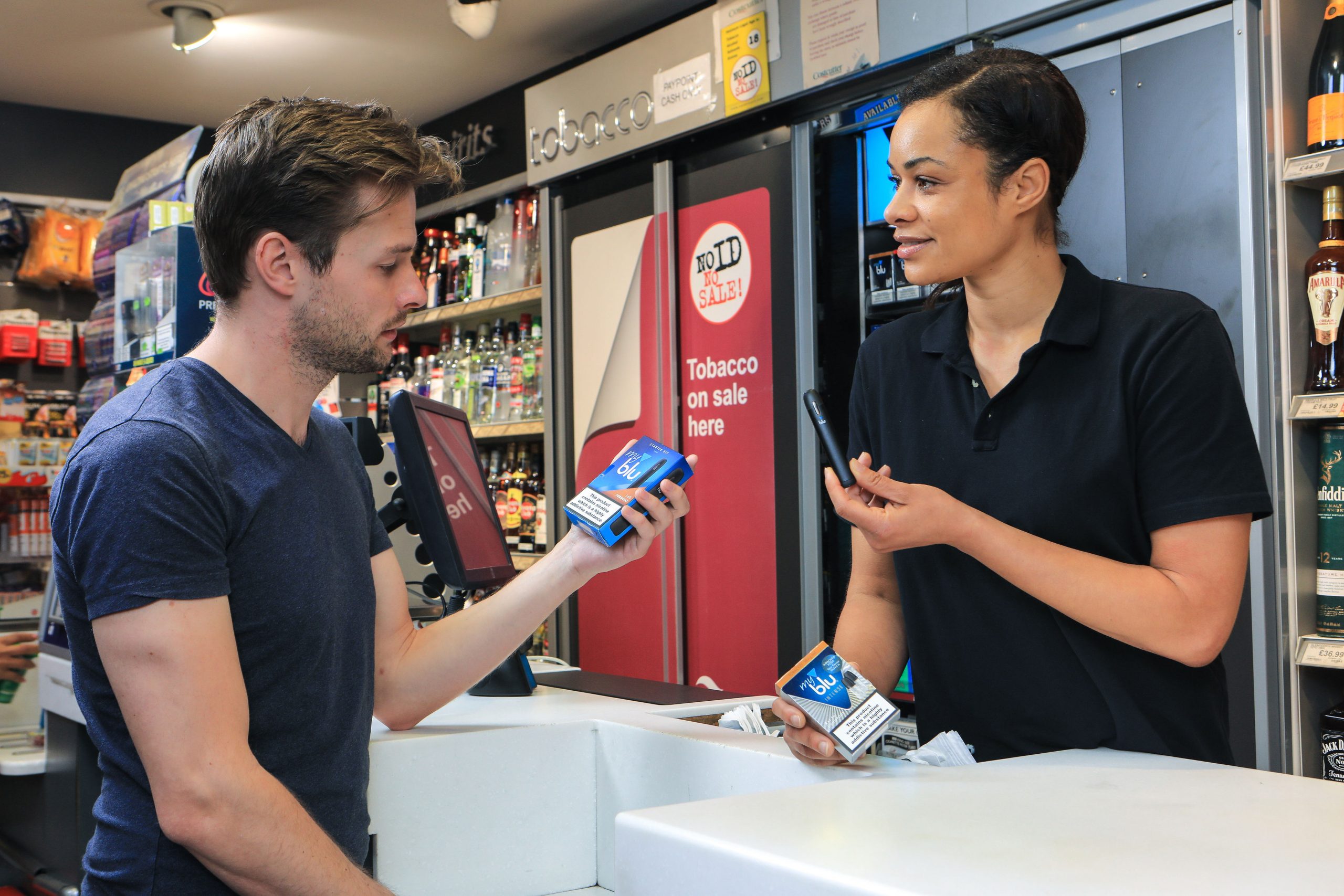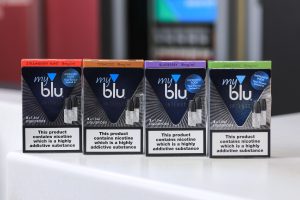EXCLUSIVE: Imperial boss Duncan Cunningham speaks to Vape Business
February 25, 2020

Duncan Cunningham, corporate affairs director at Imperial Brands, tells Tom Gockelen-Kozlowski how vaping will play a crucial role post-menthol ban.
“If we think about the arrival of the menthol ban next May, vaping will have a key role in helping people to stick with their flavour of choice and help them switch to something better.”
Duncan Cunningham, corporate affairs director at Imperial Brands, is one of a number of UK tobacco leaders to contemplate the post-menthol tobacco market and, like many, he is also of the belief that vaping needs to be front and centre of the industry’s approach.
“People widely expect the vape market to grow from £1.1bn to £1.7bn over the next five years,” says Cunningham. He also feels that, with the blu and myblu brands, Imperial has a strong hand in this growing market:
“We’re very proud of what we’ve achieved on the vape journey and with the myblu brand.”
It hasn’t all been plain sailing for Imperial in recent times – more on that later – but one question worth asking any of these emerging ‘big brands’ is what its USP is.
“We believe in the simplicity of the myblu device. It is very easy for our consumers to use and therefore very easy for our retailers to sell. It’s got a high-performance vaporizer; it has a charge time of just 20 -minutes.
“And the advantage is it uses the pod mod system, so its liquid is hassle- free and consumers can switch between flavours in seconds with a one-click-and-go system,” he adds.

The context of all this is one of the biggest changes to the tobacco market ever: the disappearance of all menthol cigarettes after 20 May. There’s no need for panic, but Cunningham thinks stores now need a step change in their preparations:
“There’s no one- fits- all approach to follow in terms of timings as every store and its customer base is unique. However, we would encourage retailers to start preparing their range for the ban now. This includes proactively engaging with menthol shoppers to assess what their plans are post-ban and adjusting the product range to cater for menthol shoppers seeking to stay in tobacco, as well as those looking to switch to something better like vaping.”
Given a few minutes to chat to a Vape Business reader one on one, what would be his message?
“Firstly, I’d say talk to your sales rep. But if it was me. I’d say there are three key areas to focus on: range, availability and education. I think it’s important that retailers stock a range of products from leading brands which include blu and pod mod system like myblu and that they offer a range of different flavours and strengths to cater to the different tastes of their customers.”
In the run-up to the ban, retailers will be closely looking at every vape brand, trying to ensure they’ve got the correct ones in store. Yet, although the menthol ban will provide a challenge, Cunningham thinks retailers will be robust enough to get through it.
“Both tobacco and vaping are highly-regulated markets so retailers are used to regulatory change. What’s important is that retailers and customers are aware of the menthol ban and we’re using our Ignite app and sales force to ensure they have a range of alternatives available when the ban comes through
So, how will the Ignite app be assisting retailers during this period?
“The Ignite programme has been there for retailers over the past five years and we keep evolving it to make sure it keeps pace with the needs of retailers. The app provides a good and growing set of educational tools to give retailers resources that they can use,” he says.
Alongside this, Cunningham gives a hint of product development to come.
“The main focus is about the education of retailers and what action they should take. We absolutely recognise the importance of menthol smokers to convenience stores so we are working with retailers to make sure there is a range of new products during the transition period and to use our salesforce to offer advice to retailers about alternative products.”
While no one outside of Imperial knows exactly what these new products might be, the fact they exist is now without doubt. And this is where we get to the well-publicised difficulties Imperial has faced.
At the beginning of the year, Imperial Brands global boss Alison Cooper left the company amid worries about the company’s direction and performance.
In November she had warned “2019 has been a challenging year with results below our expectations due to tough trading in Next Generation Products”.
The seriousness of the situation was underlined by one analyst, Russ Mould of AJ Bell, telling Reuters: “Vaping and other ‘next generation’ products were meant to be the future for Imperial Brands but growth has been slower than expected. That’s forced investors to question the future earnings potential of the business”.
Upon Cooper’s departure, Imperial Brand’s share price was down 23% year-on-year.

While some of this could be put on the global coverage of EVALI lung disease (initially blamed on vaping), it’s not the whole story and the company has admitted that blu hasn’t been “driving loyalty” as it had hoped.
As part of the changes at the top a brand refresh and portfolio of – so far under wraps – products was announced.
In the UK market, however, Cunningham’s job is to make sure customer loyalty is exactly what blu has – and he thinks with retailers choosing to stock blu, Imperial can get there: “What we recognise is that one of the most important elements in this category is to make sure that you have really good distribution and share and that’s absolutely what we’re pushing for,” he says.
A report in 2015 commissioned by Imperial did not take HNB tech seriously and doubted its harm-reduction potential – although more recently the claims for HNB have been firmed up by new research.
Five years ago, Imperial’s then-Corporate Development Officer said, “There is no difference really between those products and traditional tobacco products. It’s probably better described generically as ‘heat and burn’ rather than ‘heat not burn.’”
But some analysts disagreed, warning it might eventually cost Imperial market share.
Who was correct? Today, IQOS remains the only player in the UK’s HNB market, with a share of the e-cig sector of just one per cent.
Nevertheless, Imperial has moved far beyond its previous position, seeing the potential of HNB in the future, and has now developed its own product, Pulze, which it successfully launched in Japan.
Cunningham suggests the world has moved on since its 2015 report on IQOS.
“The vape and broader next generation products category has evolved significantly since its arrival into the market and continues to evolve at pace. As the market has advanced, so too has our research and product innovation in order to keep up with the latest market developments.”
Cunningham also says that the company is keeping the option of bringing Pulze to the UK “under close review”: “While I cannot comment on any specific reports, we continue to invest heavily into research across all areas of the market to identify new opportunities and ensure all our products meet the ever-changing needs of nicotine consumers today, and in the future.”
One thing which does seem to have changed for the company is the positive approach both the House of Commons’ Science and Technology Select Committee and treasury have taken to heat not burn in the UK. With such stringent laws around vaping and next generation products, if a product passes the bar set by the UK government, both consumers and the industry can take a huge amount of confidence from it.
This is all talk for the future, however. With a new chief executive, Stefan Bomhard, at the helm and analysts circling, that future might have to come quick. But for now, today, the focus is on delivering for retailers and taking advantage of one of the biggest opportunities vaping may ever have to boost sales.
“We’re very proud of the myblu brand and it is one which we are actively talking to customers about every day,” says Cunningham. “As we’re approaching the menthol ban on 20 May, I think it’s a fantastic opportunity to help retailers to get behind the brand.”
